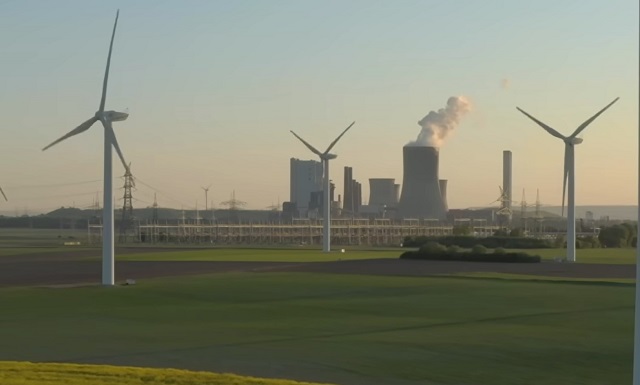Daily Caller
BP Dumping Key Green Energy Business

 From the Daily Caller News Foundation
From the Daily Caller News Foundation
By Owen Klinsky
European energy company BP has announced plans to sell its U.S. onshore wind business as it aims to concentrate on its core oil and gas business and improve investor sentiment, according to the Financial Times.
BP, along with its rival Shell, has looked to scale back on green initiatives over the past few years, rejecting further cuts to oil production in June 2023. Now, the company is looking to sell its roughly $2 billion U.S. onshore wind portfolio, which consists of stakes in ten operating wind farms and has a total net generating capacity of 1.3 gigawatts, the FT reported.
“We believe the business is likely to be of greater value for another owner,” William Lin, BP’s executive vice president for gas & low carbon energy, told Bloomberg. “This planned divestment is part of our strategy of continuing to simplify our portfolio and focus on value.”
The move comes as BP’s share price sits near a two-year low, and as the company is in the process of “shifting capital away from transition themes and back to the core business,” Biraj Borkhataria, head of European energy research at RBC Europe Ltd XYZ, told Bloomberg. It also comes as the U.S. onshore wind industry has struggled more broadly as installations have slowed due to elevated interest rates and permitting challenges, with BloombergNEF lowering its projections for new onshore wind by 22% through 2030.
BP’s offshore wind (OSW) efforts have also run into challenges, with the company writing down the value of its OSW portfolio by $1.1 billion last year, and the company’s former renewables chief, Anja-Isabel Dotzenrath, telling the FT, “offshore wind in the US is fundamentally broken.”
BP’s competitor Shell has also pivoted away from a renewables transition in recent years, with its CEO Wael Sawan describing cutting oil production as “dangerous and irresponsible.”
“I disagree with him, respectfully,” Sawan said in July 2023 in reference to UN Secretary General Antonio Guterrdaes’ comment that new oil and gas investments are “economic and moral madness.” “What would be dangerous and irresponsible is actually cutting out oil and gas production so that the cost of living, as we saw last year, starts to shoot up again.”
The onset of the Russia-Ukraine war in Feb. 2022 drove energy prices skywards, with gas surpassing $5 a gallon in June 2022, up from roughly $1.80 in April 2020, according to the Federal Reserve Bank of St. Louis.
BP did not immediately respond to a request for comment.
conflict
‘They Don’t Know What The F*ck They’re Doing’: Trump Unloads On Iran, Israel


From the Daily Caller News Foundation
President Donald Trump expressed frustration Tuesday after Iran broke a ceasefire, prompting retaliation from Israel during a gaggle with reporters on the White House lawn.
Trump announced the ceasefire Monday, saying it was supposed to take effect at 1 a.m. Eastern Daylight Time, but Iran fired missiles at Israel Tuesday. Trump vented, saying the countries had been “fighting so long” they couldn’t make peace.
WATCH:
“You know, when I say okay, now you have 12 hours, you don’t go out in the first hour just drop everything you have on them,” Trump said. “So I’m not happy with them. I’m not happy with Iran either. But I’m really unhappy if Israel is going out this morning because the one rocket that didn’t land, that was shot, perhaps by mistake, that didn’t land, I’m not happy about that.”
“We basically have two countries that have been fighting so long and so hard, that they don’t know what the fuck they are doing,” Trump added.
The United States struck facilities in Fordow, Natanz and Isfahan related to Iran’s effort to develop nuclear weapons early Sunday morning local time, using as many as 14 GBU-57 Massive Ordnance Penetrators in the operation, which involved a 37-hour flight by seven B-2A Spirit bombers.
The American strikes came ten days after Israel launched a military operation targeting the Iranian nuclear program. Iran has responded with repeated missile attacks on Israeli cities and a refusal to resume negotiations over its efforts to pursue nuclear weapons.
Automotive
Supreme Court Delivers Blow To California EV Mandates


From the Daily Caller News Foundation
“The Supreme Court put to rest any question about whether fuel manufacturers have a right to challenge unlawful electric vehicle mandates”
The Supreme Court sided Friday with oil companies seeking to challenge California’s electric vehicle regulations.
In a 7-2 ruling, the court allowed energy producers to continue their lawsuit challenging the Environmental Protection Agency’s decision to approve California regulations that require manufacturing more electric vehicles.
“The government generally may not target a business or industry through stringent and allegedly unlawful regulation, and then evade the resulting lawsuits by claiming that the targets of its regulation should be locked out of court as unaffected bystanders,” Justice Brett Kavanaugh wrote in the majority opinion. “In light of this Court’s precedents and the evidence before the Court of Appeals, the fuel producers established Article III standing to challenge EPA’s approval of the California regulations.”
Kavanaugh noted that “EPA has repeatedly altered its legal position on whether the Clean Air Act authorizes California regulations targeting greenhouse-gas emissions from new motor vehicles” between Presidential administrations.
“This case involves California’s 2012 request for EPA approval of new California regulations,” he wrote. “As relevant here, those regulations generally require automakers (i) to limit average greenhouse-gas emissions across their fleets of new motor vehicles sold in the State and (ii) to manufacture a certain percentage of electric vehicles as part of their vehicle fleets.”
The D.C. Circuit Court of Appeals previously rejected the challenge, finding the producers lacked standing to sue.
“The Supreme Court put to rest any question about whether fuel manufacturers have a right to challenge unlawful electric vehicle mandates,” American Fuel & Petrochemical Manufacturers (AFPM) President and CEO Chet Thompson said in a statement.
“California’s EV mandates are unlawful and bad for our country,” he said. “Congress did not give California special authority to regulate greenhouse gases, mandate electric vehicles or ban new gas car sales—all of which the state has attempted to do through its intentional misreading of statute.”
-

 Business2 days ago
Business2 days agoLatest shakedown attempt by Canada Post underscores need for privatization
-

 Business1 day ago
Business1 day agoWhy it’s time to repeal the oil tanker ban on B.C.’s north coast
-

 Aristotle Foundation2 days ago
Aristotle Foundation2 days agoHow Vimy Ridge Shaped Canada
-

 Alberta1 day ago
Alberta1 day agoPierre Poilievre – Per Capita, Hardisty, Alberta Is the Most Important Little Town In Canada
-

 Alberta1 day ago
Alberta1 day agoAlberta Provincial Police – New chief of Independent Agency Police Service
-

 Energy1 day ago
Energy1 day agoIf Canada Wants to be the World’s Energy Partner, We Need to Act Like It
-

 MxM News1 day ago
MxM News1 day agoUPenn strips Lia Thomas of women’s swimming titles after Title IX investigation
-

 International2 days ago
International2 days agoCBS settles with Trump over doctored 60 Minutes Harris interview






